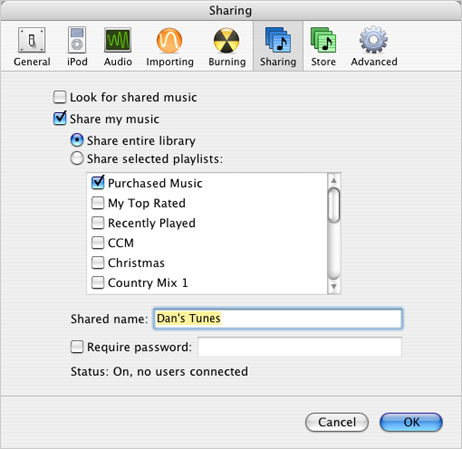You could say that music sharing has been the biggest computing
trend of the past few years. A few versions ago, iTunes added the ability
to share your personal music library with other users. Initially
you could share your library with anyone on the Internet, but now
it's limited. We'll get more into that later.
DAAP
iTunes music sharing is built on a technology called DAAP (for
Direct Audio Access
Protocol). There's not a whole lot of documentation on it
from Apple or anyone else, but for useless geek trivia, it's good
to know. It uses Rendezvous,
Apple's intelligent protocol for discovering networked devices, to
find other shared libraries on your network and then stream them to
your computer.
How Is This Useful?
Sharing music via iTunes can have many uses. My favorite is
being able to share one set of music with all of my computers. I
use both an iBook and Blue &
White G3 at home. Since I have two computers and one set of
MP3s, I can keep all of my MP3s on one computer instead of having
two copies. This is also a good feature, considering that the hard
drive in the iBook is smaller than the G3's.
There are more computers on my network. Two of them are sub-800
MHz PCs, and one is a 266
iMac, none of which can really handle a large MP3 collection.
With sharing, I can keep all my music on one computer.
iTunes' music sharing works cross-platform, so you can also
share songs with less fortunate Windows machines on your
network.
How Do I Set up Sharing?
By default, sharing your music is not enabled. Thanks to
Rendezvous, iTunes can see the shared libraries on your network
automatically.

To share your own library, go to iTunes > Preferences >
Sharing. Here you can enable it, select which playlists you want to
share, and give the library a name. You can also add a password, if
you desire.
What about AirTunes?
AirTunes
is a feature in the new Airport Express offered by Apple (see
AirPort Express: More Versatile
Than Your Average Access Point). It allows you to wirelessly
stream music from your computer to a set of speakers or a stereo
attached by a regular optical or digital hookup. So instead of
playing a song on iTunes through your computer speakers, it will
stream them to your stereo.
AirPort Express also still works as a wireless 54g router.
The newest version of iTunes (4.7), released early last week,
allows you to select from a list of available speakers connected
via AirPort Express.
Limitations on Music Sharing
iTunes file sharing has a few limitations. When it was first
introduced, you could share your libraries with anyone on the
Internet. Realizing that this could lead to piracy, Apple
restricted sharing to just your local subnet in the next iTunes
update. After all, Apple meant for this to be used to share music
with family or friends, not just anyone on the Internet.
Now you can only share music with people on your network. There
were a few programs to get around this, such as iCommune
401(ok), but they don't work with newer versions of
iTunes.
You're also limited to five users viewing your library at one
time. This isn't necessarily a problem for home users, since most
home networks contain less than six users at a time. However, with
500 people potentially being able to listen to your music at any
given time here in a Temple
University dorm, it can get a bit annoying.
Lastly, you can only play music from other users' computers, not
save it to your own library. Enabling this would obviously create a
legal issue, so the music is only meant to be streamed to other
users.
Of course, applications exist to get around this, too, such as
ourTunes.




